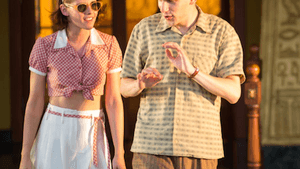Stay in the Loop
BSR publishes on a weekly schedule, with an email newsletter every Wednesday and Thursday morning. There’s no paywall, and subscribing is always free.
Too much foam, not enough java
'Café Society,' directed by Woody Allen

If I had to grade Woody Allen on Café Society, I'd give him an incomplete and tell him to see me after class. At our meeting (assuming he'd show up for it, the little flake) I'd tell him that while I admire his workmanlike approach to grinding out films (to wit: 46 features over 50 years — what’s your excuse, Mel Brooks?) I now have the same complaint about much of Woody’s recent work as I have about the middling Hollywood fare his works defy. Namely, that these films are unnecessary.
Sure, a big part of Allen's act has been to distance himself from the "artist" label. "Films are not a religion with me," he's said, and though his prolificacy seems to imply the opposite, what he means is that he's not in this racket for money or notoriety. He makes films because it's his job and because it's a way to distract himself from his existential fears (and, probably, his conscience).
Where's the joy?
Okay, fine. But he could at least put some elbow grease into these products to make them feel like more than just products. In his heyday — the mid-'70s to the late '80s — Allen was just as prolific as he is now, with the important caveat that those peak period works, while as pessimistic as ever, were each enlivened by a celebration of something — of love (Annie Hall), of family (Hannah and Her Sisters), of Manhattan (Manhattan). His best latter-day film, Midnight in Paris, was also his last film to feature the combination of snarky cynicism and wide-eyed wonder for which he's beloved by so many bespectacled smartasses (like, say, the author of this review).
Café Society seems at first like a celebration of Hollywood's Golden Age. It has a lovely look to it; Allen's one of the only directors with the understated manner necessary to portray the lushness of prewar America without turning it into a Technicolor parody of itself. (I guess he learned his lesson after The Curse of the Jade Scorpion.) But it has a hard time walking the line between screwball and satire, and ultimately we're disappointed to find that it's neither.
We begin with a New York nebbish (shocking!) played by manchild éternel Jesse Eisenberg. He's bored with the blue-collar family business, so he moves out west to work for his uncle, a hotshot Hollywood agent played by Steve Carell. Like so many protagonists, the nebbish falls unwisely in love with the first cute thing he sees, which in this movie is Carell's secretary, a smoky-eyed string bean played by Kristen Stewart.
Turns out she's in love with a married man, and before you go thinking that this sounds an awful lot like the plot of Billy Wilder's The Apartment, rest assured that Allen's thought of that, too. About 40 percent of the dialogue here is made of the name-droppings of ye olde Hollywood, and Wilder's right there alongside dead curiosities such as Joan Blondell and Errol Flynn. Nostalgia!
The head wants what it wants
The outcome of this love triangle won't surprise anyone familiar with Allen's views on the matter of passion vs. practicality (see the The Purple Rose of Cairo, Crimes and Misdemeanors). What's muddy is how we're supposed to feel about it all. Both Stewart’s and Eisenberg’s characters betray their down-to-earth roots: She marries up and starts name-dropping, while he comes to manage a hot nightclub owned by his gangster brother (Corey Stoll, who played Ernest Hemingway in Midnight in Paris). Their lives take different paths but their mutual desire remains intact. So why don't they just run off together? It's not very clear. If Allen's trying to make a comment on so-called café society, the rich and influential circles into which our protagonists become absorbed, he ought to sharpen his blade a bit. The rich and influential don't come off as any more phony than our protagonists. And maybe that's the point, but then what are the stakes? Who's the bad guy? Life, I guess, but that's no answer.
I had an okay time watching Café Society for the same reason I'm sure Woody Allen had an okay time making it: because it was something to do. But that's all it is. Woody's mystique is built on being aloof, and that detachment means he's never too emotionally invested in his projects. That's fine for him; it probably removes a lot pressure. But if Woody doesn't care, then why should we?
What, When, Where
Café Society. Woody Allen directed. Philadelphia area showtimes.
Sign up for our newsletter
All of the week's new articles, all in one place. Sign up for the free weekly BSR newsletters, and don't miss a conversation.

 Michael Fisher
Michael Fisher